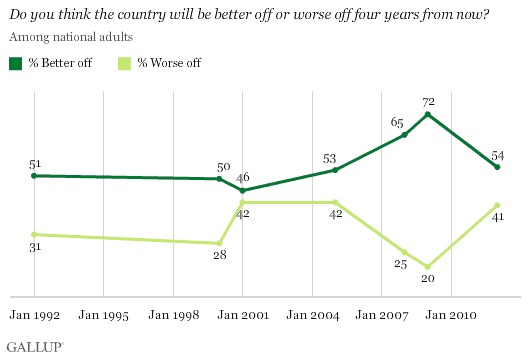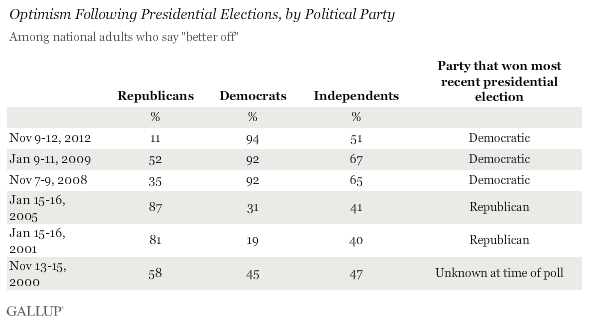WASHINGTON, D.C. -- A majority of Americans believe the country will be better off four years from now, while 41% say it will be worse. But this level of optimism is down considerably from four years ago, following President Barack Obama's first election victory, when 65% said the country would be better off in four years, and prior to his first inauguration, when 72% said the same.

At least for now, the majority of Americans agree with what President Obama said in his election-night victory speech -- "the American people … know in our hearts that for the United States of America, the best is yet to come."
While the high levels of optimism recorded shortly after Obama's 2008 election have faded, the nation's optimism resembles or exceeds levels following other recent elections. In particular, a few months after George W. Bush's re-election in 2004, a contest that also saw the incumbent president narrowly re-elected, 53% were optimistic.
The current results are from a Nov. 9-12 USA Today/Gallup poll.
Democrats Most Optimistic, Republicans Least
Democrats are nearly unanimous in their positive feelings that the next four years will be better for the country, with 94% saying so versus 4% who think things will be worse. Republicans are nearly as united but in the opposite direction, with 11% saying the country will be better off and 86% seeing the country souring. Independents are more upbeat than not about the future, 51% to 40%.

Party affiliation is typically highly related to how Americans assess the direction of the next four years. Democrats' outlook has been generally positive since Obama's election in 2008. Republicans', by contrast, has been mostly negative, though a slim majority said they expected the country to improve prior to Obama's 2009 inauguration.
On the other hand, in 2001 and 2005 -- years associated with a Republican president -- GOP supporters were extremely positive as a whole, while Democrats were much less likely to share this view. Independents have generally been positive following each presidential election, with the exception of George W. Bush's re-election in 2004.
Implications
A majority of Americans are optimistic that the country will better off four years from now. Optimism is down from 2008-2009 when Obama was first elected, but compares favorably with other recent presidential elections.
As President Obama probably knows, however, the percentage saying things will be better off in four years can quickly fade as the hard work of a new term begins, especially given the size of the nation's upcoming challenges -- in particular the "fiscal cliff," unemployment, and the many other priorities facing the president. Obama needs only look at his first term as proof positive of this: Despite 72% expressing optimism in early 2009, Obama's agenda was met with strong opposition on Capitol Hill, and eventually the president and his party were dealt a setback with the 2010 congressional elections. Many Americans have sanguine expectations for the next four years, but it will nonetheless be a challenging task to meet those goals.
Survey Methods
Results for this USA Today/Gallup poll are based on telephone interviews conducted Nov. 9-12, 2012, with a random sample of 1,009 adults, aged 18 and older, living in all 50 U.S. states and the District of Columbia.
For results based on the total sample of national adults, one can say with 95% confidence that the maximum margin of sampling error is ±3 percentage points.
Interviews are conducted with respondents on landline telephones and cellular phones, with interviews conducted in Spanish for respondents who are primarily Spanish-speaking. Each sample includes a minimum quota of 400 cellphone respondents and 600 landline respondents per 1,000 national adults, with additional minimum quotas among landline respondents by region. Landline telephone numbers are chosen at random among listed telephone numbers. Cellphone numbers are selected using random-digit-dial methods. Landline respondents are chosen at random within each household on the basis of which member had the most recent birthday.
Samples are weighted by gender, age, race, Hispanic ethnicity, education, region, adults in the household, population density, and phone status (cellphone only/landline only/both, cellphone mostly, and having an unlisted landline number). Demographic weighting targets are based on the March 2011 Current Population Survey figures for the aged 18 and older population living in U.S. All reported margins of sampling error include the computed design effects for weighting.
In addition to sampling error, question wording and practical difficulties in conducting surveys can introduce error or bias into the findings of public opinion polls.
View methodology, full question results, and trend data.
For more details on Gallup's polling methodology, visit https://www.gallup.com/.
